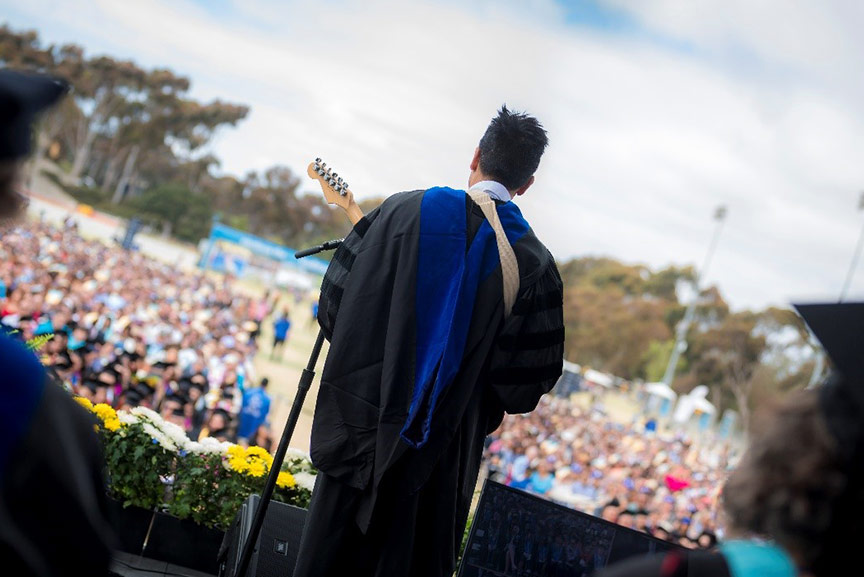Commencement Speech Is a Study in Flow States
By Molly Wofford

Dystopian societies may be a staple of science fiction writers, but at least one researcher at UC San Diego believes a better real-world future is possible if we all just use our imaginations.
“Live well, love boldly and help us all, together, imagine into reality a better future for our world.” Those were the closing words to an inspirational commencement address by research scientist Albert Yu-Min Lin to the 2018 graduating class of UC San Diego’s Thurgood Marshall College. Lin’s nine-minute speech was mostly improvised and uniquely delivered with the accompaniment of an electric guitar and was also an unintentional demonstration of one of his latest research topics: flow states.
As Director for the Center for Human Frontiers at UC San Diego’s Qualcomm Institute, Lin is interested in exploring a future that “blends mind, body and technology,” and as a National Geographic Explorer who treks through jungle terrain on a high-tech prosthetic leg, he is a living embodiment of his scientific aspirations. It was the loss of his leg last year that led him to be interested in flow state, which is generally defined as an optimal and focused state of consciousness in which elevated performance and achievement is possible. Lin credits a positive mental flow state with helping him overcome phantom leg syndrome after the loss of his leg and is now investigating ways for people to easily access higher mental states as a means of treating depression, easing pain and maximizing human potential.
As he was preparing for his upcoming commencement address, Lin’s thoughts turned to a deeper examination of the nature of the event thanks to his flow state research, which involves studying cultural rituals throughout the world.
“I’ve been thinking more and more about the purpose of ceremonies and how they are actually refined procedures, or even technologies, that shift our perspectives and thus our minds,” said Lin. “The more authentically in the moment we can be, the more effective the perspective shift or neuroplasticity we can create.”
For the students involved, graduation ceremonies are a defined moment of transition in life, and Lin wanted to honor that transition with a meaningful tribute. While preparing himself mentally for a capacity crowd of 1,000 graduates plus their family and friends, inspiration struck him.
“I realized the best way that I could beat the metaphorical drum of that transformation would be with all guards down and an open heart,” explained Lin. “So I grabbed my guitar and went improv.”
With music as a guide, Lin delivered an unplanned, heartfelt and engaging speech about choices, metamorphosis, empathy and taking risks in life that managed to feel both soothing and inspiring at the same time. For Lin, the experience was exactly the kind of altered mental state that he tries to document in his research.

“It was really quite incredible, very surreal, to look over a crowd that large and feel that kind of deep connection even for a matter of minutes,” he said. For many in the audience, the feeling was mutual.
“Albert’s speech was amazing,” said Leslie Carver, Professor of Psychology and Provost of Thurgood Marshall College. “The student’s absolutely loved it. In my humble opinion, we had the best speaker of the weekend.”
Now that commencement is over, Lin is back at work pondering what it means to be human while using biosensors, virtual reality and augmented reality to not only increase the scientific understanding of mental flow states, but to also, possibly, imagine the world into a better place.

